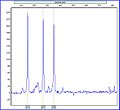Aneuploidy facts for kids
Aneuploidy (say: an-yoo-PLOY-dee) is a special condition where a cell has too many or too few chromosomes. Chromosomes are like tiny packages inside the nucleus of our cells that carry all our genetic information. Normally, each type of living thing, or species, has a set number of chromosomes. But with aneuploidy, a cell might have one or a few extra chromosomes, or it might be missing one or a few. This often happens when cells divide and the chromosomes don't split up correctly.
Aneuploidy can lead to genetic disorders, which are health problems caused by changes in our genes or chromosomes. It can also cause birth defects, which are health problems present at birth. Sometimes, aneuploidy can even cause a miscarriage, which is when a pregnancy ends too early.
Contents
What Causes Aneuploidy?
Aneuploidy usually happens during cell division. Our bodies are made of trillions of cells, and new cells are constantly being made through a process called cell division. Before a cell divides, it makes copies of all its chromosomes. Then, these copies are supposed to split evenly between the two new cells.
When Chromosomes Don't Separate
Sometimes, during cell division, the chromosomes don't pull apart correctly. Imagine you have two sets of building blocks, and you need to give one set to each of two friends. If you accidentally give one friend too many blocks and the other too few, that's similar to what happens with aneuploidy. One new cell ends up with an extra chromosome, and the other new cell ends up missing a chromosome.
Common Types of Aneuploidy
The most common type of aneuploidy that people are born with is Down syndrome. This condition happens when a person has an extra copy of chromosome 21. Instead of having two copies of chromosome 21, they have three. This is why Down syndrome is also called Trisomy 21 (tri-SO-mee twenty-one), because "tri" means three.
Living with Down Syndrome
People with Down syndrome often have unique facial features and may have some learning differences. They might also have certain health issues, like heart problems. However, many people with Down syndrome live full and happy lives and can grow into adulthood. They go to school, have jobs, and contribute to their communities.
Aneuploidy and Cancer
Scientists have also noticed that many cancer cells have an unusual number of chromosomes. This means that cancer cells often show aneuploidy. Some scientists believe that having too many or too few chromosomes might actually help cause cancer to grow, rather than just being a result of the cancer itself. This is an area that researchers are still studying.
Images for kids
-
A karyogram shows all the chromosomes from a cell, arranged by size. This one is from a normal male human.
-
This image shows how scientists can detect Trisomy 21 by looking for an extra copy of chromosome 21.
See also
 In Spanish: Aneuploidía para niños
In Spanish: Aneuploidía para niños
 | James B. Knighten |
 | Azellia White |
 | Willa Brown |



